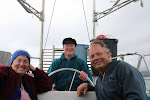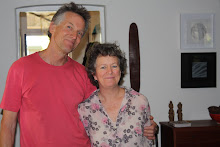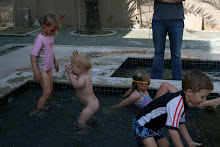Friday, 6 February 2009
travels in the Middle East
Early up and on the road to Lebanon. The hotel has organised a cheerful driver and with a mixture of French and English, he conducts us out of Damascus and over the mountains to Lebanon. The border is uneasily filled with soldiery and the passport and tax protocols are manouevres which we are glad to have a guide for. This is the top of the anti Lebanon mountain, and not far above us we see snow covered peaks. Over the border and the landscape becomes almost immediately richer, more fertile, the earth the colour of Sumac, a rich reddish colour which makes the sheep and goats a rich reddish colour too. Our first call is to the early Islamic town of Anjar which was discovered in the late 1940's. In the guide book it is spoken of as a unique example of a site from a single period, a trace of the Umayyads. We are the only visitors on a most beautiful day and we pick our way down its Roman layout, tracing the main street, the palace, great and small, marvelling at the intricate bits of pillar. The quiet and the absence of anybody else allowed the impact of the place to really impress itself on us. On to Baalbac next, across miles of Bekaa Valley where Turkish workers live in uncomfortable looking settlements and work on the rich land. Baalbac must rank as one of the wonders of the world, where layers of history are remarkably preserved. The temple to Bacchus is said to be the best preserved example in the world. Here, what impresses, is the sheer magnitude of construction, the huge pillars, some of which lie like fallen giants across the site, some of which tower huge and upward. Again, we are amongst a handful of visitors and the glorious weather with clear blue sky makes us, feel as we have discovered it for ourselves. We travel on to Ksara vineyard, just outside Zhale, this is most sophisticated vineyard in the French style, we are given a tour and a tasting and remarkably no pressure to buy anything. On to Zhale which in summer is where Beirutis go for days out. Small restaurants, most closed at this time of year line the banks of the river which tumbles down from the mountain, with that sort of bluey water that you associate with melting snows. Our driver then conducts us into Beirut which is a really imposing modern city, after our trave3ls so far, we feel dusty and out of place at the huge Phoenica Hotel which has and imposing marble staircase and security at the door. In the glass cases round the hotel are jewels which are so huge and glitzy that they would pull your ear lobes off. We wander round Beirut in the early evening looking for an ATM where we take out 4 million Lebanese pounds, 95000 of which we spend on a modest dinner in a smart Lebanese fish restaurant. I find myself full of wonder Isabelle if you read this at the way the Brahma Kumaris reach into all these places, the sense of aridity is palpable in both physical and subtle worlds and I imagine the kindliness of the BK's being like an oasis in a desert
Subscribe to:
Post Comments (Atom)



































































No comments:
Post a Comment